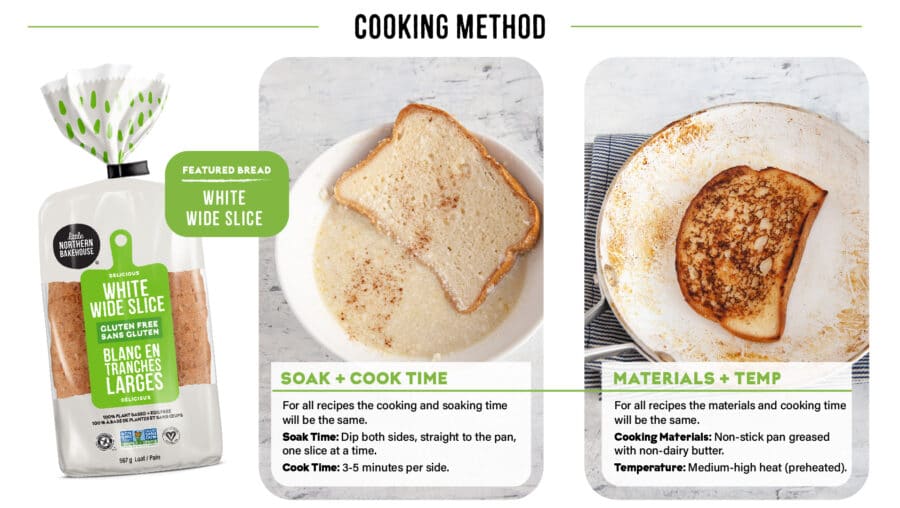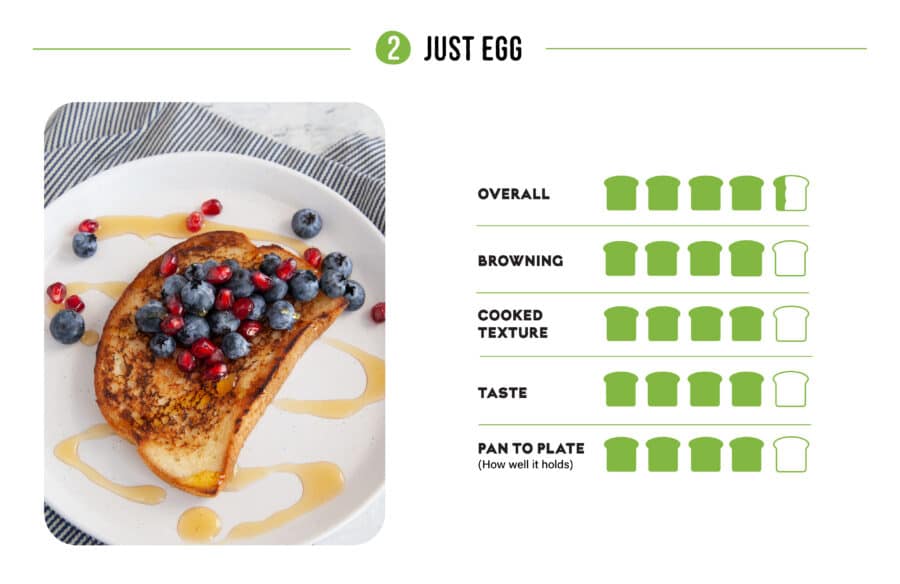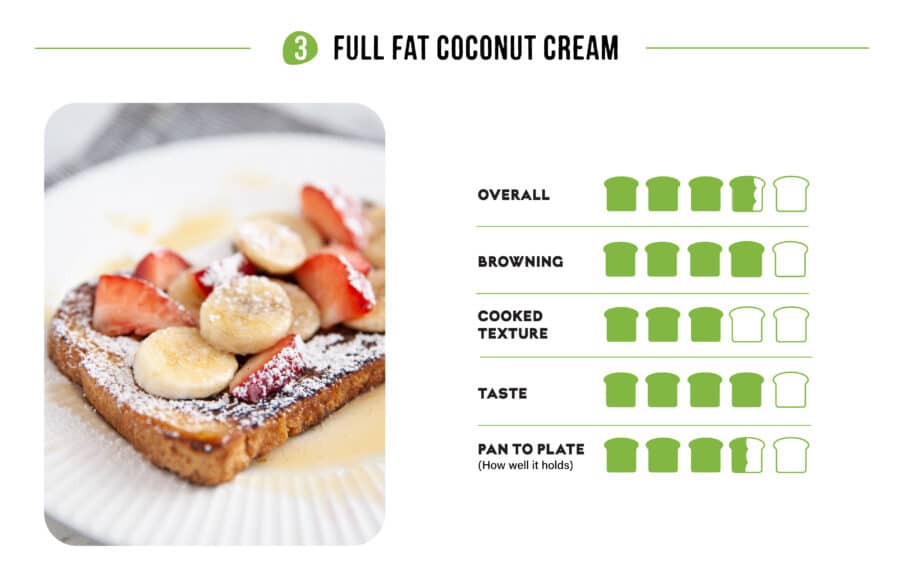The secret to great french toast lies in the batter. With traditional french toast, this usually requires an egg-based mixture to dunk the bread into before frying. Eggs give traditional french toast a crispy outside and infuse rich flavours into a chewy-but-tender center.
So how do you make eggless french toast? We’ve tested a few egg substitutes to determine the best way to make this classic breakfast—and keep it plant-based.
Problem:
Recreating the perfect french toast experience with gluten-free bread and vegan ingredients is challenging and often disappointing.
We want to know:
Which is the best vegan batter to give gluten-free French toast that classic tender-but-chewy inside with a crisp and delicious golden-brown outside?
To make it a fair test of the perfect vegan batter for gluten-free french toast, we tested each batter with the same bread (Little Northern Bakehouse White Wide Slice), cooked each one using the same tool (a non-stick pan) and cooking method (in non-dairy butter over medium-high heat), flavoured the batter with the same amount of vanilla and maple syrup, and taste-tested each one with the simplest, classic toppings (non-dairy butter and a teaspoon of maple syrup).
Because it’s always been a dependable go-to, we used our Eggless French Toast recipe as a control, and compared it to a batter made with JUST Egg and a batter made with full fat coconut milk to see which produced the best vegan gluten-free french toast. All of these recipes make enough batter for eight pieces of french toast.
Controls
How did we judge which vegan batter is most successful at achieving the classic french toast texture with gluten-free bread? We used our senses! We compared how well it browned (visual), how crispy it was on the outside and how chewy-but-tender it was on the inside (touch), how delicious (or not!) it was (taste), and how well the texture held up from pan to plate—and to fork.
We gave each category a score out of 5 for each batter we tested, then gave each batter an overall score. (And we’ll tell you what we loved—and what we learned—about each!
How to Make the Best Vegan French Toast
To determine which eggless substitute is best, we judged the three options based on four categories:
- Browning: Does the vegan french toast develop that famous golden brown crisp around the outside of the bread.
- Cooked Texture: How does it feel when you take a bite?
- Taste: How does it taste? (Pretty self-explanatory)
- Pan to Plate: Does the french toast hold its integrity when transferring from pan to plate?
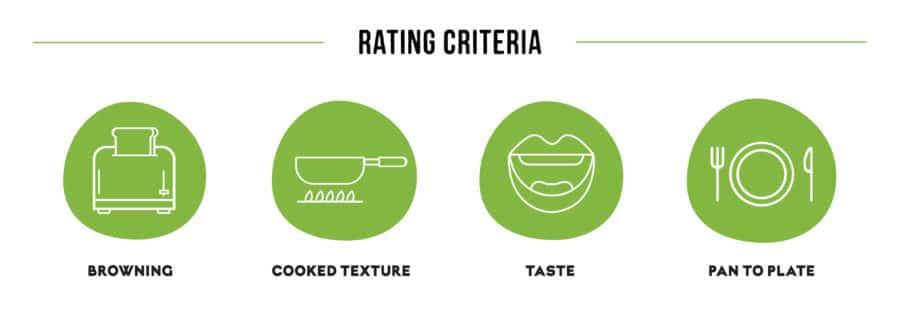
Each eggless batter substitute will receive a score in each category out of 5—with 1 being the lowest score and 5 being a perfect score.
Overall Tips for the Best Vegan Gluten-free French Toast
- Conventional french toast is often made with harder, close-to-stale, or day-old bread. This is even more important when cooking with gluten-free bread because it helps the french toast hold its shape better. This will also help make the french toast less soft.
- To avoid an overly soft or soggy french toast, soak your bread for slightly less time than you would with a traditional batter and conventional bread.
As we tested these ingredients using the same methods, we noted some helpful tips to make each ingredient shine in its own way.
Now that we have our criteria let’s see which is the best eggless substitute to make the batter for your vegan french toast. Is it JUST Egg? Full fat coconut cream? Or our go-to classic Eggless French Toast recipe? Read on to find out!
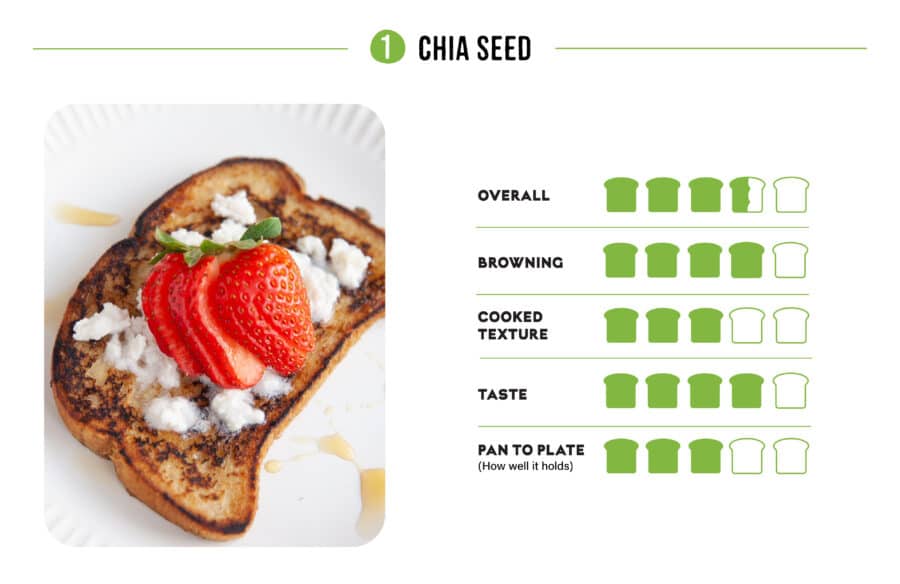
Using pre-ground chia seeds, (or blend or grind your own until it reaches a powder state.) See step 1 in our Classic Eggless French Toast recipe for instructions on how to make the batter.
Amount Used:
- 1 tablespoon of ground chia seeds and 1 cup of non-dairy milk
- 1 tablespoon maple syrup
- 1 teaspoon vanilla
Cook Time:
2 1/2 minutes per side (had to cook longer to allow the bread to crisp)
Heat:
Medium-High
Pros
- The french toast had a neutral flavour with soft hints of vanilla.
Cons
- The texture may be too soft on the inside for some people. It depends on your preference.
JUST Egg is a vegan gluten-free liquid egg substitute, made with chickpeas. It’s particularly convenient because you can use as-is, straight from the bottle. Add your favourite flavourings and easily scale up or down to make as much french toast as you desire. Look for it in the fridge section of your grocery store.
Amount Used:
- 3 tablespoons JUST Egg
- 1 cup oat milk
- 1 tablespoon maple syrup
- 1 teaspoon vanilla
Cook Time:
2 1/2 Minutes per side
Heat:
Medium-High
Pros
- Just Egg is very easy to work with.
- The results were very similar to traditional french toast in both the consistency of the batter, and the overall flavour.
- The french toast comes out with a familiar texture if you prefer a firmer french toast.
Cons
- Although we didn’t add salt, we found the JUST Egg version to be saltier than the other eggless batter options.
- The outside cooked slightly crispier than traditional french toast.
Tips
- For best results with this JUST Egg batter, cook on medium heat for a softer consistency, and medium-high heat for a crispier texture.
Like applesauce or banana purée, one tablespoon of coconut cream can be used as a substitute for egg in some recipes. Because of the extra lushness, we figured it would be a tasty option in our vegan french toast. You can use the top layer of a can of full fat coconut milk or use coconut cream.
Amount Used:
- 1 tablespoon coconut cream or the top layer of a can of coconut milk (not the watery liquid below)
- 1 cup unsweetened oat milk
- 1 tablespoon maple syrup
- 1 teaspoon vanilla
Cook Time:
2 1/2 Minutes
Heat:
Medium-High
Pros
- The french toast turned out to be very flavourful, with a prominent coconut taste.
Cons
- French toast made with coconut cream may be too soft for some preferences. We found it had somewhat of a gummy texture.
Tips
- To avoid an overly soft french toast using this recipe, soak your bread for slightly less time than you think you need to.

What is the Best Egg-free Batter for Gluten-free French Toast?
The winner of this test kitchen is…up to you! It all depends on your taste and preferences. If you prefer a crispier more classic french toast, you’ll enjoy the JUST Egg base. If you prefer a softer french toast with a more unique flavour, we recommend you go with the full fat coconut cream. Or if you want a truly neutral base for any flavour you want to throw into your french toast, our Eggless French Toast recipe with chia seeds is a fantastic place to start. Now you and your family can eat vegan and gluten-free french toast, and experience all the joy of the real thing!
For more gluten-free resources, subscribe to our monthly newsletter at the bottom of this page. Do you know of any good eggless substitutes for french toast? Post your makes to Facebook, Instagram, and Pinterest—and don’t forget to tag us!
